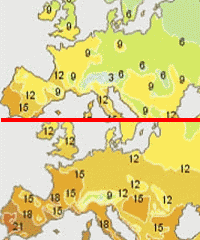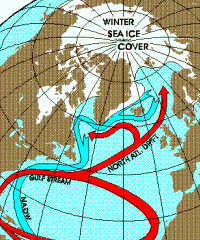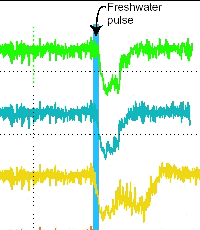|
|
 |
What do climate experts really expect?
Hollywood and the Pentagon-Study come along with dark visions. But what do climate experts really say?
|
|
Global warming will mould the future of our climate system. The warming of the air next to the Earth's surface is caused by the greenhouse effect, which itself is caused by strong emissions of carbon dioxide as well as methane and other greenhouse gases. The average temperature of the Earth is going to increase significantly during the next decade, and will most likely continue for several centuries. Warming of the oceans will follow the warming of the air. It cannot be excluded that the long term sea ice melting in the Arctic could cause an abrupt climate change and a sudden regional cooling in northern and mid-European areas. But in no way will this compare to an ice age.
|
Global Warming
We are living in a phase of increasing global warming. The Earth's average temperature near the surface has increased by about 0.6°C over the last 100 years. In the last three decades this trend has accelerated and all climate models predict a further acceleration. For the next century, experts from the IPCC expect a further warming of about 1.4 to 5.8°C. The exact value depends primarily on our individual energy consumption, the development of energy production methods and the world's population. A warming of 4.6°C compares to the difference between the average temperature in London (9.7°C) and Madrid (14.3°C). For the European region this could be a realistic projection. As a consequence wind patterns and precipitation and hence farming and social problems will be changing. There is more information about this topic in the global warming section.
|
 |
 |
 |
|
The upper map shows average yearly temperatures for the time span 1961-1990, the map below the projection for the time span 2071-2100. - Source: Sweclim / Naturvardsverket
|
|
Ocean currents
The importance of the oceans for our climate is also not fiction. The oceans are in a state of continuous flow and they transport heat from regions of the Earth, where the sun provides a lot of energy (tropics), to the cooler regions. The relatively mild climate of Europe originates in the Gulf Stream (red in the diagram), in particular the North Atlantic stream, as part of the Gulf Stream. Ocean circulation is driven by two factors: 1) the wind and 2) the differences in density of water. In turn, the water density depends on the temperature and salinity of the water. If air temperature rises, the surface temperature of the oceans will also slowly increase. There is more information about this topic in the text "ocean in flux".
|
 |
 |
 |
|
Ocean currents in the North Atlantic. Branching off from the gulf stream the northatlantic current (both in red) brings warmth to northern Europe.
Source: Stefan Rahmstorf / Nature
|
|
Sudden climate changes
In more recent times, in climate terms, there have been several abrupt climate changes, in particular during and towards the end of the last ice age (more than 10,000 years ago). An abrupt change means an increase or collapse of temperature by several degrees centigrade within a few decades. Such sudden changes take place when a certain climate factor reaches a certain threshold. Such a turnover could have been caused by a change in the major ocean currents. Scientists found out, that about 8200 years ago a temperature collapse occurred over Greenland and northern Europe following the continuously rising temperatures that were observed after the last ice age. This is assumed to have been a consequence of the ocean current stopping due to warmer surface water and melting water of low salinity. It cannot be excluded that, as a consequence of the present warming, such an event could take place again, but this is not expected to occur in this century. More details on this topic can be found in the abrupt climate change section.
|
 |
 |
 |
|
Abrupt climate changes in the North Atlantic, caused by a freshwater pulse from melting ice, can be simulated in ocean models.
Simulation: Renssen et al., 2002
|
|
|
 |
|







